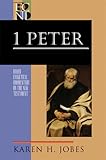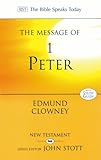 I’ve already reviewed a number of commentaries in this volume of the Revised Expositor’s Bible Commentary (see Hebrews, Revelation, John’s Letters). The same complements on the nice layout apply here.
I’ve already reviewed a number of commentaries in this volume of the Revised Expositor’s Bible Commentary (see Hebrews, Revelation, John’s Letters). The same complements on the nice layout apply here.
J Darryl Charles has provided the commentary on 1 & 2 Peter and Jude. The big danger with this commentary series is that it can fall through the gaps between an expositional and an academic commentary. It is aimed at “expositors”, but does not always provide enough space to really engage with the exegetical and theological issues that can be raised. Its strength therefore is in helping the reader to appreciate the meaning and flow of the argument, and briefly filling in background historical details or scriptural cross-references that will elucidate the text. There are brief pointers for application, but this series is not an exposition in the style of the Bible Speaks Today series. For those preparing a sermon or essay on the passage being commented on, I expect they would actually want to consult more detailed commentaries, but this commentary will still have value as a reference book for those wanting to quickly get an overview of a section of these epistles.
In the introduction to the 1 Peter commentary, Charles argues that it is reasonable to believe Peter authored this epistle. He acknowledges some differences in style to 2 Peter, but he gives a list of 41 similarities between the two epistles, which weaken the case for separate authors. In the commentary on 1 Peter, he highlights Peter’s concern for ethical living, which is rooted in eschatology. He notes that the epistle is filled with imperatives, and though it has suffering as a theme, its goal is not to provide a “theology of suffering” but rather to present a Christian ethic which responds to suffering by following the example of Christ.
The commentaries on 2 Peter and Jude have a fairly lengthy introduction which argues for Petrine authorship of 2 Peter, and lists the parallels with Jude. Despite the similarities, the purposes are different: Peter is more concerned with ethics than combating heresy. If Peter is combating anything, it is more likely sexual libertarianism than gnosticism. He presents the Lord’s coming as a day of moral reckoning and calls us to live virtuously. Charles believes that Peter even warns against the possibility of “loss of call” for the Christian. In the introduction to Jude, Charles considers the arguments against an early dating to be merely speculative. Jude uses examples of those who were privileged but who became dispossessed as warnings against apostasy.
For those who cannot afford to buy individual commentaries on each book of the New Testament, the Revised Expositor’s Bible Commentary represents a good compromise – offering essentially six commentaries for the price of one. While none of the individual commentaries would be described as “must haves”, they will prove useful to those who do not have the time or money available to consult the larger commentaries.


